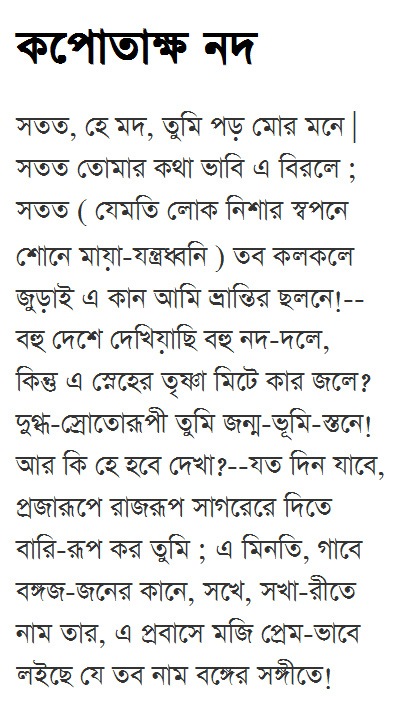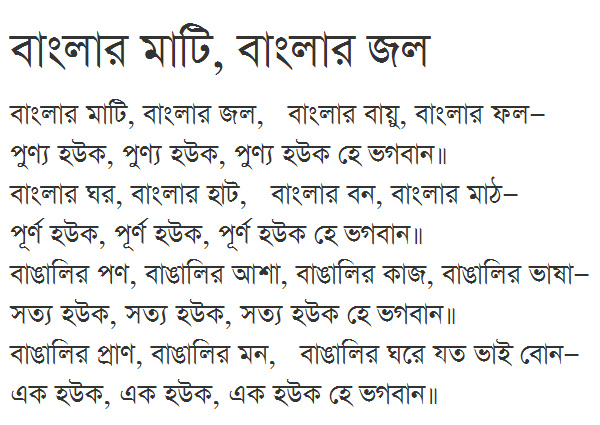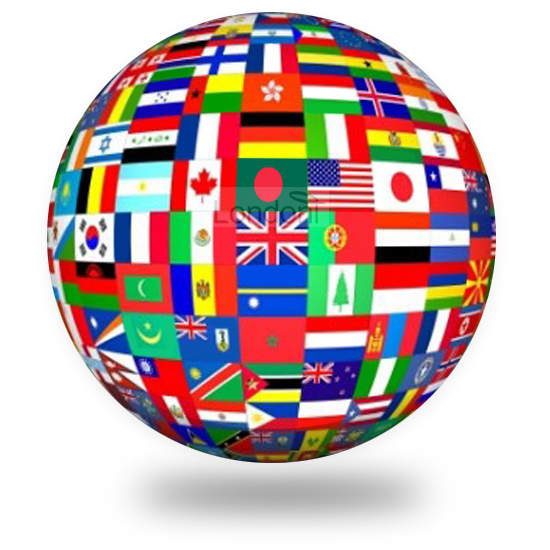
Importance of language
Last updated: 5 October 2017 From the section 1952 Bhasha Andolon
Language is a crucial part of any culture. It is important in building a democratic state and transcends the distinctions of class. It is the first tool for a child to express himself or herself.
Language is a dominant feature in determining the bases of nationalism or ethnicity, as it represents a nation’s identity and preserves its heritage. It is also the driving force behind the unity of the peoples and makes them distinct from other nations. Once a language is adopted into a society it is difficult to eliminate it until the society itself decides to change or adopt something different.
Language becomes a symbol of identity when different ethnic groups compete for power and resources. Easy communication facilitates the manipulation of group identities on the basis of religion or language.
In industrial, modern societies one simply cannot enter the domains of power without being able to manipulate language for entry into these domains. It is the language of employment, and without employment one cannot possess much power in modern societies.
Dr. Tariq Rahman, author of "Language and Politics in Pakistan" (1996)
No better form of expression then your own mother language
It is often said that poets and writers find some of their best pieces of work in their own language. William Shakespeare, widely regarded as the greatest writer in the English language, wrote his masterpiece "Romeo and Juliet" (c. 1591) in English. Victor Hugo wrote "Les Miserable" (1862) in his mother tongue French. Leo Tolstoy wrote "War and Peace" (1869) in his native language Russian. The first Chinese to win Nobel Prize in Literature, Gao Xingiian, wrote his award winning "Soul Mountain" (1990) in Chinese. And there are many other literary master pieces that were fist written in the respective mother tongue and then translated into other languages.
Literature is woven round the lives of people like a spider's web. Literature therefore is at its epic when it speaks the language of the people.
Michael Madhushodhon Dutta, the father of Bangla sonnets and the pioneer of Bangla literature, spoke of a void in his work after adopting English as his medium for his early literary work (such as poetry and drama) and not using his mother tongue Bangla.
Michael Madhushudan Dutta reflecting on the loneliness of his soul while he is away from his homeland, away from his mother tongue, in the poem "Kopothakko Nod"
In stark contrast, Rabindranath Tagore's literature flourished in Bangla. He covered each and every aspect of life with his literary work and it was Bangla that brought him all the glory, including the Nobel Prize for Literature (1913).
"Banglar Mati, Banglar Jol" by Rabindranath Tagore
From an early age, Madhusudan desired to be an Englishman and was lured by the works of English poet Byron. However, he was to regret his desire in later life when he talked ardently of his homeland as is seen in his poems and sonnets from this period.
On the other hand, come to Rabindranath Tagore, writing in Bangla how he remains, even to this day the versifier of Bangla literature! Tagore's works touch the souls of people and fill the hearts with joy. The hearts are enlightened with the messages in his poems, songs, fictions and plays. A section of the songs of "Gitobitan" is dedicated to "shodesh" (motherland). He was deeply patriotic and like an artist painted the picture of Bangla throughout his literary life. His works reverberate his love for motherland and mother tongue.
The Daily Star (Bangladesh)
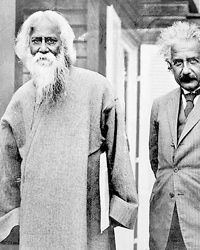 Rabindranath Tagore (aka Robindronath Thakur) (1861 - 1941)
Rabindranath Tagore (aka Robindronath Thakur) (1861 - 1941) 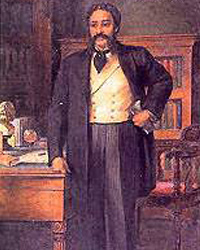 Michael Madhusudan Dutta (1824 - 1873)
Michael Madhusudan Dutta (1824 - 1873)  William Shakespeare (1564 – 1616) English poet and playwright.
William Shakespeare (1564 – 1616) English poet and playwright. Victor (Marie) Hugo (1802 - 1885) French poet, novelist, and dramatist who was the most well-known of all the French Romantic writers. Among many volumes of poetry, 'Les Contemplations' and 'La Légende des siècles' stand particularly high in critical esteem. Outside France, his best-known works are the novels 'Les Misérables' (1862) and 'Notre-Dame de Paris' (1831), also known in English as 'The Hunchback of Notre-Dame'.
Victor (Marie) Hugo (1802 - 1885) French poet, novelist, and dramatist who was the most well-known of all the French Romantic writers. Among many volumes of poetry, 'Les Contemplations' and 'La Légende des siècles' stand particularly high in critical esteem. Outside France, his best-known works are the novels 'Les Misérables' (1862) and 'Notre-Dame de Paris' (1831), also known in English as 'The Hunchback of Notre-Dame'. Lev Nikolayevich Tolstoy (aka Leo Tolstoy) (1828 – 1910) Russian writer who primarily wrote novels and short stories. Later in life, he also wrote plays and essays. His literal interpretation of the ethical teachings of Jesus, centering on the Sermon on the Mount, caused him in later life to become a fervent Christian anarchist and anarcho-pacifist. His ideas on nonviolent resistance, expressed in such works as 'The Kingdom of God Is Within You', were to have a profound impact on such pivotal twentieth-century figures as Mohandas Gandhi and Martin Luther King, Jr.
Lev Nikolayevich Tolstoy (aka Leo Tolstoy) (1828 – 1910) Russian writer who primarily wrote novels and short stories. Later in life, he also wrote plays and essays. His literal interpretation of the ethical teachings of Jesus, centering on the Sermon on the Mount, caused him in later life to become a fervent Christian anarchist and anarcho-pacifist. His ideas on nonviolent resistance, expressed in such works as 'The Kingdom of God Is Within You', were to have a profound impact on such pivotal twentieth-century figures as Mohandas Gandhi and Martin Luther King, Jr. Gao Xingjian (Born 1940) Chinese novelist, playwright, critic, and renowned stage director and an artist. First Chinese to be awarded Nobel Prize for Literature (2000) "for an oeuvre of universal validity, bitter insights and linguistic ingenuity". Migrated to France in 1987 and granted French citizenship in 1997.
Gao Xingjian (Born 1940) Chinese novelist, playwright, critic, and renowned stage director and an artist. First Chinese to be awarded Nobel Prize for Literature (2000) "for an oeuvre of universal validity, bitter insights and linguistic ingenuity". Migrated to France in 1987 and granted French citizenship in 1997.
Motherland, mother tongue and the mother herself are essential to epitomize a person's life. The importance of these in the over all development of an individual is immense. Without the proper identity of these in life a person is like a wingless bird. The mother tongue is like the wind under the wings. It is the medium through which self- expression takes place in its highest form. There are people who can express themselves well in foreign languages too. However history seems to show that it is the mother tongue that bears the beacon.
The Daily Star (Bangladesh)

